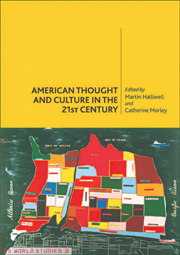Book contents
- Frontmatter
- Contents
- Acknowledgements
- Notes on the Contributors
- Introduction: The Next American Century?
- PART 1 POLITICS
- PART 2 SOCIETY
- PART 3 CULTURE
- 13 Contemporary American Culture
- 14 Cultural Pluralism and National Identity
- 15 Writing in the Wake of 9/11
- 16 American Ways of Seeing
- 17 Television and Digital Media
- 18 Animation and Digital Culture
- Bibliography
- Index
14 - Cultural Pluralism and National Identity
from PART 3 - CULTURE
Published online by Cambridge University Press: 05 August 2013
- Frontmatter
- Contents
- Acknowledgements
- Notes on the Contributors
- Introduction: The Next American Century?
- PART 1 POLITICS
- PART 2 SOCIETY
- PART 3 CULTURE
- 13 Contemporary American Culture
- 14 Cultural Pluralism and National Identity
- 15 Writing in the Wake of 9/11
- 16 American Ways of Seeing
- 17 Television and Digital Media
- 18 Animation and Digital Culture
- Bibliography
- Index
Summary
Fundamental concerns about cultural pluralism are evident in America's continued emphasis upon the principle of e pluribus unum. The notion of ‘one nation under God, indivisible’ remains a crucial aspect of a united American identity, with ethnic and cultural differences assimilated to ensure a homogeneous ‘Americaneity’ based primarily on the enduring worldview and ideologies of the original white, Anglo-Saxon, Protestant pilgrims. In the context of immigration, the primary source of American cultural pluralism, this remains of extreme importance in the 21st century, as millions continue to emigrate to the US each year. While immigration numbers rose so that 10 per cent of all Americans are ‘foreign-born’ at the turn of the millennium, projections for 2007–60 suggest that immigration figures could rise by a further 63 per cent or 105 million.
Yet in the wake of 9/11, both public opinion and government policy has begun to react not only to external attacks upon and criticisms of American national identity, but also to the rise in the numbers of immigrants to the US and their ability and/or desire to assimilate to a single homogeneous American identity. The result has been a tightening not only of America's national borders but also of the boundaries of national cultural identity, evident in the passing of legislature such as the Patriot Act of 2001. Responding to the need for greater national security after 9/11, the very name of the Patriot Act suggests America's increasingly nationalist focus, and responds to widespread anxieties over ever more diverse definitions of American cultural identity.
- Type
- Chapter
- Information
- American Thought and Culture in the 21st Century , pp. 227 - 244Publisher: Edinburgh University PressPrint publication year: 2008



